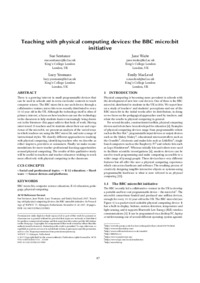Teaching with physical computing devicesthe BBC micro: bit initiative
Publikationsdatum:
|
 |
 Diese Seite wurde seit 1 Jahr inhaltlich nicht mehr aktualisiert.
Unter Umständen ist sie nicht mehr aktuell.
Diese Seite wurde seit 1 Jahr inhaltlich nicht mehr aktualisiert.
Unter Umständen ist sie nicht mehr aktuell.
 Beats Biblionetz - Texte
Beats Biblionetz - Texte Teaching with physical computing devicesthe BBC micro: bit initiative
Publikationsdatum:
|
 |
 Diese Seite wurde seit 1 Jahr inhaltlich nicht mehr aktualisiert.
Unter Umständen ist sie nicht mehr aktuell.
Diese Seite wurde seit 1 Jahr inhaltlich nicht mehr aktualisiert.
Unter Umständen ist sie nicht mehr aktuell.
 Zusammenfassungen
Zusammenfassungen  Dieses Konferenz-Paper erwähnt ...
Dieses Konferenz-Paper erwähnt ... Dieses Konferenz-Paper erwähnt vermutlich nicht ...
Dieses Konferenz-Paper erwähnt vermutlich nicht ... 
 Tagcloud
Tagcloud Zitationsgraph
Zitationsgraph  Zitationsgraph (Beta-Test mit vis.js)
Zitationsgraph (Beta-Test mit vis.js) 7 Erwähnungen
7 Erwähnungen 
 Anderswo finden
Anderswo finden  Volltext dieses Dokuments
Volltext dieses Dokuments  Anderswo suchen
Anderswo suchen 
 Beat und dieses Konferenz-Paper
Beat und dieses Konferenz-Paper Biblionetz-History
Biblionetz-History 
 QR-Code dieser Seite
QR-Code dieser Seite